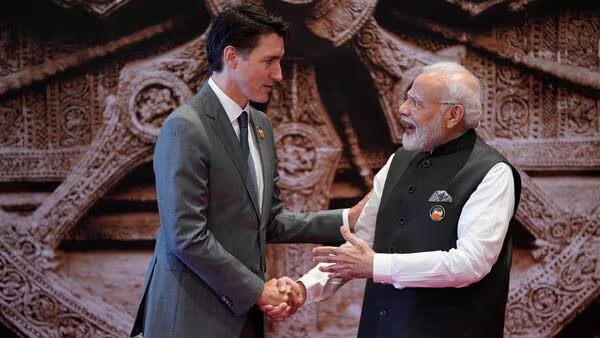Lagatar24 Desk
New Delhi: In a significant escalation of tensions, India has summoned Canada’s charge d’affaires, Stewart Wheeler, following accusations from the Canadian government linking Indian diplomats to the killing of Khalistani terrorist Hardeep Singh Nijjar. The diplomatic summons comes after Canada reportedly labeled Indian High Commissioner Sanjay Kumar Verma and other diplomats as “persons of interest” in their investigation into Nijjar’s 2023 murder.
India’s Ministry of External Affairs (MEA) denounced these allegations, calling them “preposterous” and part of a “political agenda” driven by Canada’s Prime Minister Justin Trudeau, accusing him of pandering to vote bank politics. India dismissed the claims as baseless, asserting that the accusations aimed to malign Indian diplomats without evidence.
“The Government of India strongly rejects these imputations and attributes them to the political agenda of the Trudeau Government that is centred around vote bank politics,” the MEA said in a statement. The ministry further warned that India “reserves the right to take further steps” in response to what it called Canada’s fabricated claims.
Diplomatic Tensions Over Khalistani Terrorist’s Murder
The diplomatic row between New Delhi and Ottawa has been simmering since Canadian Prime Minister Trudeau suggested there were “credible allegations” linking Indian intelligence to Nijjar’s killing in 2023. India, which designated Nijjar as a terrorist in 2020, had previously dismissed the accusations as “absurd.” Now, with Canada’s alleged move to implicate High Commissioner Sanjay Kumar Verma in the case, tensions have reached a new peak.
Verma, a seasoned diplomat with over 36 years of experience, has previously served as Ambassador to Japan and Sudan, among other countries. The MEA called Canada’s attempts to cast aspersions on his reputation “ludicrous and deserving of contempt.”
Long-Standing Strains in India-Canada Relations
The diplomatic relationship between the two nations has been under strain for years, largely due to Canada’s alleged tolerance of pro-Khalistan elements operating freely within its borders. India has consistently raised concerns over this, accusing Canada of failing to curb Khalistani extremism.
The situation worsened after Trudeau’s 2018 visit to India, which was widely criticized for attempting to appeal to a pro-Khalistan vote bank in Canada. Trudeau’s cabinet has also been criticized by Indian officials for including individuals with alleged ties to extremist agendas.
Though Prime Minister Narendra Modi and Trudeau recently had a brief interaction at the ASEAN Summit in Laos, sources from New Delhi indicated that no substantial discussions took place. Trudeau later emphasized that the safety of Canadians and the rule of law remain his government’s top priorities.
Canada is home to approximately 770,000 Sikhs, making up around two percent of its population. The presence of pro-Khalistan supporters within Canada has been a major sticking point in India-Canada relations.







